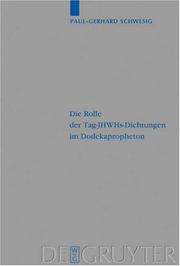| Listing 1 - 3 of 3 |
Sort by
|
Book
ISBN: 9080641022 Year: 2005 Publisher: Beringen Gwosdz
Abstract | Keywords | Export | Availability | Bookmark
 Loading...
Loading...Choose an application
- Reference Manager
- EndNote
- RefWorks (Direct export to RefWorks)
de Christelijke Getuigen van Jehovah --- ethiek --- het Wachttorengemeenschap --- predikingswerk --- de Nieuwe Wereldvertaling --- Bijbelteksten --- JHWH --- het Nieuwe Testament

ISBN: 9783110190175 3110190176 3110925087 Year: 2006 Volume: 366 Publisher: Berlin: de Gruyter,
Abstract | Keywords | Export | Availability | Bookmark
 Loading...
Loading...Choose an application
- Reference Manager
- EndNote
- RefWorks (Direct export to RefWorks)
Als Texte, die den Tag JHWHs zum Thema haben, werden Am 5,18-20; Zef 1,2-18; Obd; Joel 2,1-11; 4,1-17; Sach 14; Mal 3,13-21.22-24 im Kontext ihrer jeweiligen Schriften interpretiert, nach Beziehungen zu redaktionellen Vorstufen des Zwölfprophetenbuchs befragt und in ihrem Zusammenhang untereinander sowohl auf diachroner als auch auf synchroner Ebene untersucht. Die Ergebnisse der Arbeit leisten einen Beitrag zur aktuellen Debatte um Entstehung und Einheit des Zwölfprophetenbuchs und zur Geschichte der JHWH-Tags-Vorstellung. The texts thematising the Day of JHWH are Am 5,18-20; Zp 1,2-18; Ob; Jl 2,1-11; 4,1-17; Zc 14; Ml 3,13-21.22-24. They are interpreted within the context of their relevant books, their connections with preliminary editorial phases of the Book of the Twelve are investigated, and their connections with each other are examined on both a diachronic and a synchronic level. The results of this study feed into the current debate on the origins and unity of the Book of the Twelve and the history of the concept of the Day of JHWH.
Bible OT. Twelve prophets --- Day of Jehovah --- Bible --- Criticism, interpretation, etc --- Day of Jehovah. --- Bible. --- Criticism, interpretation, etc. --- 224.6 --- Day of the Lord --- Day of Yahveh --- Jehovah, Day of --- Lord, Day of the --- Yahveh, Day of --- Kleine profeten--(algemeen) --- Book of the twelve Minor Prophets (Books of the Old Testament) --- Minor Prophets (Books of the Old Testament) --- Tere ʻaśar (Books of the Old Testament) --- Twelve Prophets (Books of the Old Testament) --- Judgment Day --- Kingdom of God --- Biblical teaching --- Book of the Twelve. --- day of JHWH.
Book
ISBN: 1575066165 9781575066165 9781575061726 1575061724 Year: 2021 Publisher: University Park, PA
Abstract | Keywords | Export | Availability | Bookmark
 Loading...
Loading...Choose an application
- Reference Manager
- EndNote
- RefWorks (Direct export to RefWorks)
In the Judeo-Christian tradition, the deity YHWH is often portrayed as an old man. One of the epithets used of YHWH in the Hebrew Bible, the Ancient of Days, is a source for this depiction of God as elderly. Yet, when we look closely at the early traditions of biblical Israel, we see a different picture: God is relatively youthful, a warrior who defends his people. This book is an examination of the question: How did God become old? The transformation from young deity to Ancient of Days took place at the intersection of two trajectories in the traditions of Israel. One trajectory is reflected in the way that apocalyptic traditions found in the book of Daniel recast the old Canaanite mythic imagery seen in the Ugaritic and early biblical texts. This trajectory allows YHWH to take on qualities, such as old age, that were not associated with him during most of Israel's history but were associated with El in the Canaanite traditions. The second trajectory, a depiction of Israel's God as elderly, is connected with the development of the idea of YHWH as father. The more comfortable the biblical tradents became with portraying YHWH as a father a metaphor that was not embraced in the early traditions the easier it became for the people of Israel to think of YHWH as occupying a stage of the human life cycle.
God (Judaism)
---
Age of God
---
Age
---
Age.
---
Attributes
---
Bible.
---
Antico Testamento
---
Hebrew Bible
---
Hebrew Scriptures
---
Kitve-ḳodesh
---
Miḳra
---
Old Testament
---
Palaia Diathēkē
---
Pentateuch, Prophets, and Hagiographa
---
Sean-Tiomna
---
Stary Testament
---
Tanakh
---
Tawrāt
---
Torah, Neviʼim, Ketuvim
---
Torah, Neviʼim u-Khetuvim
---
Velho Testamento
---
Criticism, interpretation, etc.
---
Gottesvorstellung.
---
Alter.
---
Zeit.
---
Eigenschaft Gottes.
---
Literatur.
---
Jahwe.
---
Altes Testament.
---
Altes Testament
---
Tenach
---
Testamentum vetus
---
Vetus testamentum
---
Erstes Testament
---
<
| Listing 1 - 3 of 3 |
Sort by
|

 Search
Search Feedback
Feedback About UniCat
About UniCat  Help
Help News
News